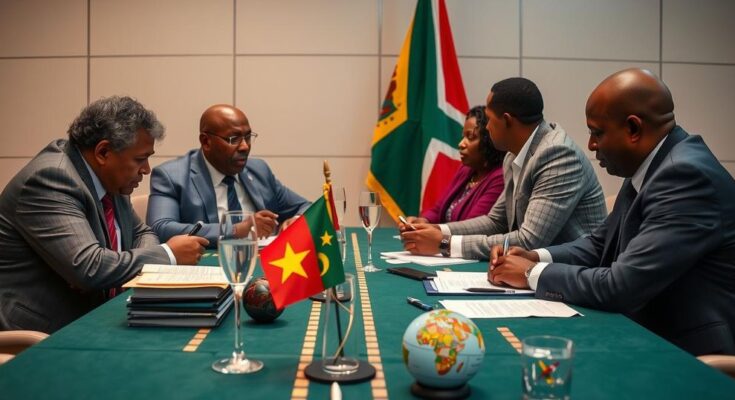Mozambique experiences a severe political crisis following disputed election results, leading to violent protests and calls for intervention. South Africa is stepping in as a mediator amidst significant unrest, with experts advocating for transparent recounts and possible power-sharing agreements. Ongoing concerns regarding judicial impartiality and the socio-economic backdrop underline the challenges ahead for resolution.
As Mozambique faces intense political turmoil following disputed election results, analysts express hope for resolution through regional mediation, particularly by South Africa. The Southern African Development Community (SADC) has struggled to facilitate substantial dialogue, prompting South Africa’s intervention through bilateral discussions aimed at establishing a framework for conflict resolution. This crisis was triggered by opposition rejection of the electoral commission’s declaration of a Frelimo candidate as the election winner amid allegations of vote rigging and violence against protesters. In total, over 110 lives have reportedly been lost during the unrest. Rights organizations have condemned state security forces for their excessive responses.
As discussions commence in Malelane, South Africa’s Foreign Minister Ronald Lamola leads a delegation poised to negotiate with Mozambican officials. Rich Mashimbye from the University of Johannesburg has indicated that while these talks represent a promising beginning, they must later involve higher-level leadership to successfully address the escalating crisis. He also recommends a transparent recount process and a power-sharing agreement, a strategy that has historically ameliorated political disputes in other African nations. However, skepticism surrounds the potential for effective mediation, given the credibility concerns surrounding both the SADC’s leadership and Mozambique’s judiciary. In light of growing disillusionment among Southern African voters towards long-standing ruling parties, the socio-economic conditions prevailing in Mozambique further exacerbate the political climate, posing a long-term challenge for stability.
Mozambique is currently at a crucial point in its political landscape, following recent elections marred by allegations of fraud and subsequent violent protests. The unrest began after the ruling party, known as Frelimo, was declared the victor in the presidential election, an outcome strongly contested by the opposition. With an alarming death toll resulting from the protests and accusations of excessive force by security forces, calls for mediation from regional leaders have intensified. The need for external intervention is underscored by the failure of previous efforts from local organizations like the Southern African Development Community.
In summary, Mozambique’s political crisis necessitates urgent mediation from regional actors like South Africa to mitigate ongoing violence and address the legitimacy of electoral processes. The anticipated role of external entities may pave the way for constructive dialogue aimed at a power-sharing resolution, echoing successful historical precedents in other African nations. However, the overarching challenges of judicial credibility and systemic socio-economic issues remain formidable hurdles that could complicate the peace efforts.
Original Source: www.aa.com.tr




